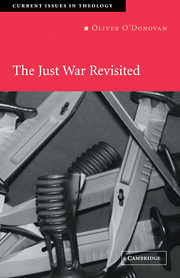5 - Can war crimes trials be morally satisfying?
Published online by Cambridge University Press: 05 June 2012
Summary
The classic just-war theorists of the sixteenth century assumed that the conclusion of hostilities would, as a matter of course, be marked by an attempt on the part of the victors to punish the vanquished, by confiscations, executions, and possibly the deposition of the ruler. They never questioned the right to such exercises of post bellum jurisdiction, but they inclined to discourage them and to limit their scope. Their reasons can be summarised as three.
(a) It encouraged, they feared, the vices of implacability and vengefulness, attitudes inconsistent with the judicial frame of mind fundamental to a just war. ‘It is necessary to preserve in war the same equality as in a just judgment,’ wrote Suárez. Vitoria, in the fine peroration of his lecture on the Law of War, invited the victor to ‘think of himself as a judge sitting in judgment between two commonwealths, the one the injured party and the other the offender; he must not pass sentence as the prosecutor but as a judge’. The conduct of the victor, then, must be discriminating, making a point of distinguishing those especially active in promoting the unjustified hostilities from the innocent. ‘It does not suffice’, wrote Grotius, ‘that we conceive the enemy, by some fiction, as though they were a single body.’
[…]
- Type
- Chapter
- Information
- The Just War Revisited , pp. 109 - 123Publisher: Cambridge University PressPrint publication year: 2003

